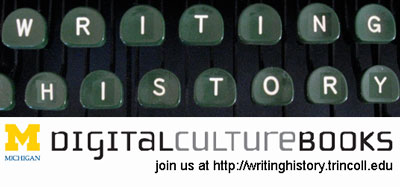Schrag-Cohen debate on developmental editing and PressForward
¶ 1
Leave a comment on paragraph 1 0

¶ 2 Leave a comment on paragraph 2 0 Follow the healthy debate between Zachary Schrag and Dan Cohen on the “developmental editing” of scholarly work in traditional journals and online innovations (such as PressForward by the Center for History and New Media). Cohen mentions Writing History in the Digital Age, our open peer-reviewed edited volume of thirty essays, and contrasts it with an individual scholar’s “more modest experiment” in posting her work for commentary on the web:
Surfacing, supporting, and expanding that gift economy is one of the goals of PressForward. Although those in the digital humanities often point to big experiments in open review—Jack Dougherty and Kristen Nawrotzki’s Writing History in a Digital Age, for instance, recently received hundreds of high-quality comments—it’s also important to recognize the increasing frequency of more modest experiments on the web.
For instance, this summer, while working on an article on a fourteenth-century motet, the Oxford musicologist Elizabeth Eva Leach posted a draft to her blog for comment. She didn’t receive hundreds of comments, but some helpful colleagues interested in the subject matter read the draft carefully and wrote in suggestions for improvement. Those little moments happen every day on the open web, and I suppose where Zach and I disagree is in their value. I’ve seen some extraordinarily extensive comments that easily equal the comments of a dedicated editor, whereas Zach worries that without that editor’s dedication, some scholars will receive no feedback.
With PressForward, we are not only trying to aggregate and curate high-quality, vetted scholarly content; we are trying to aggregate the attention of scholars so we can point to pieces like Leach’s, which in turn will receive more in-depth commentary. My view, perhaps colored by six years of blogging, is that there are many intelligent voices out there prepared to provide criticism. And the more commenters, the wider the range of views and suggestions, as opposed to the voice of a lone editor.
¶ 6 Leave a comment on paragraph 6 0 It’s a pleasant surprise to see what I had thought of as our small-time operation referred to as a “big experiment” in the digital humanities. But the comparison with Leach’s individual posting reinforces why our volume looks the way it does. Like many other species, scholars find safety in numbers. One of our greatest fears is: if we post our work online, will anyone come to comment on it? Six weeks and over 500 comments later, we’re beginning to learn what does (and does not) work with crowd-sourced developmental editing, and the role played by our prospective publisher, the University of Michigan Press. By holding each other’s hands and taking these big steps together, newbies in digital humanities (myself included) are beginning to think more broadly (and breath more comfortably) about what’s possible in this rapidly changing world of scholarly publishing.

Comments
Comments are closed
0 Comments on the whole Post
0 Comments on paragraph 1
0 Comments on paragraph 2
0 Comments on paragraph 3
0 Comments on paragraph 4
0 Comments on paragraph 5
0 Comments on paragraph 6